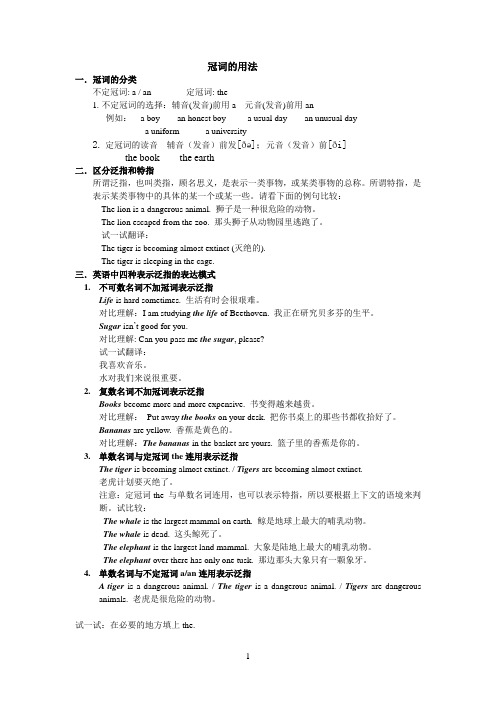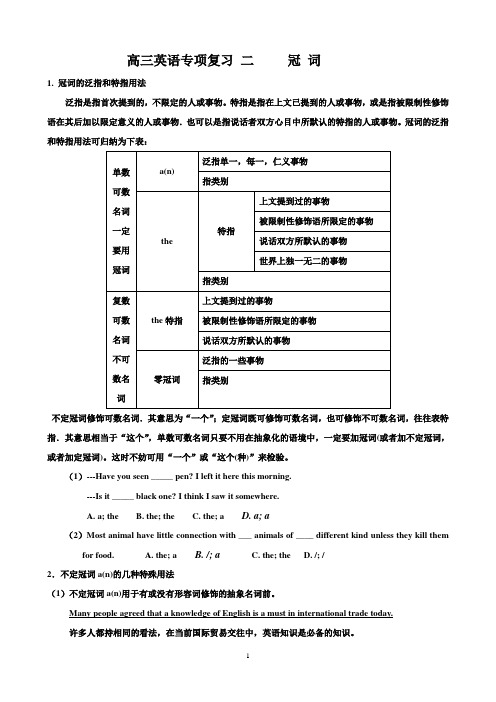2.冠词
- 格式:ppt
- 大小:663.00 KB
- 文档页数:43

冠词a和the的用法区别冠词 "a" 和 "the" 是英语中最常见的两个冠词,同时也是学习者经常遇到困惑的问题。
它们的使用虽然简单,但有时候会有一些细微的差别。
本文将详细讨论这两个冠词的用法区别。
一、定义和基本用法1. 冠词“a”:它是一个基本冠词,表示不确定或泛指的含义。
通常用于单数可数名词前。
2. 冠词“the”:它是一个特定冠词,表示确定或特指的含义。
通常用于特定人或物的名字前。
二、不确定(泛指)和确定(特指)的区别1. 不确定性(泛指):当我们不具体地提到某个人或物时,可以使用“a”。
例如,“I saw a car on the street.”(我在街上看到了一辆小汽车)。
2. 确定性(特指):当我们提到已被明确指代的人或物时,应该使用“the”。
例如,“The car that I saw on the street was red.”(我看到的那辆小汽车是红色的)。
三、可数名词与不可数名词1. 可数名词:a) 首次提及:当我们首次提到一个可数名词时,应该使用“a”。
例如,“I sawa dog in the park.”(我在公园里看到了一只狗)。
b) 后续提及:当我们再次提到同一个可数名词时,应该使用“the”。
例如,“The dog was chasing its tail.”(那只狗正在追逐自己的尾巴)。
2. 不可数名词:a) 泛指:当我们泛指一个不可数名词时,通常不使用任何冠词。
例如,“She has experience in teaching.”(她有教学经验)。
b) 特指:当我们特指一个不可数名词时,应该使用“the”。
例如,“I want to drink the water in this bottle.”(我想喝这个瓶子里的水)。
四、特殊情况和用法1. 专有名词:a) 不使用冠词:专有名词通常不需要冠词。
例如,“Tom is my friend.”(汤姆是我的朋友)。



冠词的用法一.冠词的分类不定冠词: a / an 定冠词: the1.不定冠词的选择:辅音(发音)前用a 元音(发音)前用an例如: a boy an honest boy a usual day an unusual daya uniform a university2.定冠词的读音辅音(发音)前发[ðə];元音(发音)前[ði]the book the earth二.区分泛指和特指所谓泛指,也叫类指,顾名思义,是表示一类事物,或某类事物的总称。
所谓特指,是表示某类事物中的具体的某一个或某一些。
请看下面的例句比较:The lion is a dangerous animal. 狮子是一种很危险的动物。
The lion escaped from the zoo. 那头狮子从动物园里逃跑了。
试一试翻译:The tiger is becoming almost extinct (灭绝的). ______________________The tiger is sleeping in the cage. _______________________________三.英语中四种表示泛指的表达模式1.不可数名词不加冠词表示泛指Life is hard sometimes. 生活有时会很艰难。
对比理解:I am studying the life of Beethoven. 我正在研究贝多芬的生平。
Sugar isn’t good for you.对比理解: Can you pass me the sugar, please?试一试翻译:我喜欢音乐。
_________________________水对我们来说很重要。
_______________________2.复数名词不加冠词表示泛指Books become more and more expensive. 书变得越来越贵。
对比理解:Put away the books on your desk. 把你书桌上的那些书都收拾好了。

冠词归纳总结大全初中语文导语:冠词是初中语文中的重要知识点之一,也是学好语文的基础。
掌握好冠词的用法不仅能够提高语言表达能力,还能够帮助我们理解阅读材料。
本文将对初中语文中常见的冠词进行归纳总结,以帮助同学们更好地掌握冠词的用法。
一、定冠词定冠词包括“a”和“an”,在语法上称为不定冠词。
它们的使用主要依据以下几点:1. 不定冠词“a”用于辅音音素开头的单词前,如"a book"(一本书)。
2. 不定冠词“an”用于元音音素开头的单词前,如"an apple"(一个苹果)。
3. 不定冠词可以用于可数名词的单数形式前,表示泛指,如"a student"(一个学生)。
4. 不定冠词不能用于复数名词、不可数名词、专有名词前。
二、不定冠词的特殊用法除了泛指名词之外,不定冠词还有以下特殊的用法:1. 表示数量或程度的不定冠词:- 如"a few"(几个)、"a little"(一些)、"a lot of"(许多)、"a great deal of"(大量的)等。
- 如"He has a few good friends."(他有几个好朋友。
)2. 表示职业、国籍或宗教的不定冠词:- 如"I am a teacher."(我是一名教师。
)、"He is an American."(他是一个美国人。
)三、定冠词的用法定冠词“the”在初中语文中是最常见的冠词,有以下几个用法:1. 特指某一事物:- 如"The book on the table is mine."(桌子上的书是我的。
)2. 表示整体或普遍概念:- 如"The sun rises in the east."(太阳从东方升起。

高三英语专项复习二冠词1. 冠词的泛指和特指用法泛指是指首次提到的,不限定的人或事物。
特指是指在上文已提到的人或事物,或是指被限制性修饰语在其后加以限定意义的人或事物.也可以是指说话者双方心目中所默认的特指的人或事物。
冠词的泛指和特指用法可归纳为下表:不定冠词修饰可数名词.其意思为“一个”;定冠词既可修饰可数名词,也可修饰不可数名词,往往表特指.其意思相当于“这个”,单数可数名词只要不用在抽象化的语境中,一定要加冠词(或者加不定冠词,或者加定冠词)。
这时不妨可用“一个”或“这个(种)”来检验。
(1)---Have you seen _____ pen? I left it here this morning.---Is it _____ black one? I think I saw it somewhere.A. a; theB. the; theC. the; aD. a; a(2)Most animal have little connection with ___ animals of ____ different kind unless they kill them for food. A. the; a B. /; a C. the; the D. /; /2.不定冠词a(n)的几种特殊用法(1)不定冠词a(n)用于有或没有形容词修饰的抽象名词前。
Many people agreed that a knowledge of English is a must in international trade today.许多人都持相同的看法,在当前国际贸易交往中,英语知识是必备的知识。
(2)不定冠词s(n)用于有形容词修饰的一日二餐前。
Before I go to work every morning, I’ve a light breakfast.我每天早晨上班前.吃点简单的早餐。
(3)不定冠词a(n)用于有形容词修饰的季节、日期前。
英语的虚词与实词虚词<介词、代词、连词、冠词、数词>虚词没有实在意义,不能独立承担句子成分,包括冠词、介词、连词和感叹词:而且还有一个重要的特点,那就是,虚词没有词形的变化:一、冠词art..:用在名词前,帮助说明名词;如:a,an,the.1.不定冠词:a,an2.定冠词:the二、介词prep.:表示它后面的名词或代词与其他句子成分的关系;如in,on,from,above,behind, across, against, along, around, among, before, below, beneath, besides, beyond, despite, during, except, front, including, inside, like, into, next, near, of, onto, out, out of, outside, over, owning to, per, regarding, since, through, till, towards, under, unlike, until, up, upon, via, while, with, within, without…1.简单介词:是由一个单词构成的介词;可分为三类:①普通介词:如at,by,for,from,in,of,on,to,with等②合成介词:如onto,into,within等③分词介词:如including等2.二重介词:是由两个简单介词连用而构成的介词; 如:from behind,since before,until after等3.短语介词:是由两个或两个以上的词所组成的短语构成的介词;如:in front of,becauseof,instead of等三、连词conj.:用来连接词、短语或句子;按在句子中的作用可分为并列连词和从属连词:After, although, also, and, anywhere, as, as long as, as soon as, because, before, both…and…but, considering, either…or…even if, even so, even though,, everywhere, for, hence, however, if, in case, in order that, instead of, likewise, never, nevertheless, not only…but also, now that, once, or, otherwise, regardless, since, so, so that, such that, thus, till, until, unless, when, whenever, wherever, whether, where, while…1.并列连词①表示平行或对等关系的并列连词:and,both…and,as well as,not only…but also,neither…nor等②表示转折关系的并列连词:but,yet,while等③表示选择关系的并列连词:or,either…or等④表示因果关系的并列连词:for,so等2.从属连词:是引导从句的连词①引导名词性从句的连词:that,whether,if②引导副词性从句的连词:when,while,as,since,before, after,once,as soonas,until,till,because,now that,although,though,even if,even though,no matter how,no matter what,whatever,however,whether…or,if,unless,so long as,as long as,in order that,sothat,so…that,as if,as though,than,where,wherever等四、代词pron.:主要用来代替名词;如:all, another, any, anybody, anyone, anything, each, either, every, everybody, everything, he, her, himself, themselves, itself, I, it, me, mine, yours, neither, nobody, none, nothing, other, others, so, some, something, someone, that, these, they, this, th ose, us, what, whatever, when, whenever, who, whoever, whose, …五、感叹词interj..表示喜、怒、哀、乐等感情;如:oh,well,hi,hello1.名词前面一般用冠词,代词或介词等;①. A young man, while traveling through a desert, came across a spring of clear water. ________ water was sweet.②. Besides, shopping at this time of the year was not ________ pleasant experience.③. The young man went home ________ a happy heart.④. Mo Yan won the Nobel Prize for ________ great works.⑤._______ time going by, the boy has grown into a strong man.⑥.The girl danced ______ the music of Paul Mallrat’s band.2. 缺主语或宾语,一般填代词;①. Here are two bags. The blue ________ is mine.②. Suddenly the wall moved——________ was made of trees.③. New technologies have made _________ possible to turn out new products faster.④._________ is important for our students to exercise one hour every day.3.并列的两个或多个单词,短语,或句子之间设空,一般填入并列连词and, but, or等;①. Each winner receives a gold medal, a diploma ________ a sum of money.②. He was very tired from doing this for a whole day, ________ he felt very happy.③. Which do you prefer, folk music ________ pop music4.两句之间,如果不是并列句,则很可能是主从句,因此需要填入从属连词what, which, who, how, when等;比如宾语从句,定语从句或者是状语从句的连接词;这种空格需要同学们根据句子结构,分析到底是什么从句,从而选择合适的从属连词;①. Finally he reached a lonely island ________ was completely cut off from the outside world.②. ________hard your try, it is difficult to lose weight.③. If you happen to get l ost in the wild, you’d better stay ________ you are.④. ________we have enough evidence, we cannot win the case.⑤. Some children want to challenge themselves by learning a language different from______ their parents speak at home.⑥.At the same time, there had been a growing number of overseas students ________came back to China after study.⑦.My face turned red on hearing ________ my mother said.⑧._______ she couldn’t understand was _______ fewer and fewer students showed interest in her lessons.⑨.It was the ability to do the job ____ matters not where you come from or what you are.⑩.No sooner had she gone out___________ a student came to visit her.实词是指有实在意义,能独立承担句子成分的词,包括名词、代词、形容词、副词、动词和数词;而且还有一个重要的特点,那就是,实词有词形的变化,尤其是动词,可谓变化多端:1、名词n.:表示人、事物、地点或抽象概念的名称;如:boy,morning,bag,ball,class,orange.2、形容词adj..:表示人或事物的性质或特征;如:good,right,white,orange .3、数词num.:表示数目或事物的顺序;如:one,two,three,first,second,third,fourth.4、动词v.:表示动作或状态;如:am,is,are,have,see .5、副词adv.:修饰动词、形容词或其他副词,说明时间、地点、程度等;如:well,very,here,often,quietly,slowly.构词法 Word Formation在英语中词的构成方式主要有三种:合成、转化和派生;一、合成 Compounding 两个或更多的词合成一个词;方式:1. 直接写在一起; 2. 用连字符-连接; 3. 由两个分开的词构成;1 合成形容词2合成动词3合成名词4合成副词however, maybe, wherever, whenever, forever5合成代词whoever,, whatever, everyone, nobody, myself, something, anything,二、派生 Derivation注意: -ese, -ian, -ist 既可以构成名词,又可以构成形容词;三、转化 Conversion: 指一个词不变化词形,而由一种此类转化为另一种词类或几种词类;1. 名词和动词之间的转化telephone电话——打电话, mirror镜子——像镜子一样反映, drink喝——饮料, record录音——记录, name, date, hand, study,2. 形容词转化为动词 perfect完美的——使完善3.名词转化为形容词副词 front前面——前面的4.形容词转化为名词 chief 主要的——首领-alarrive —n. __________ chemistry —adj. __________ memory—n. __________—v. __________ music—adj. __________—n. __________ survive—n. __________—n. __________ try—n. __________-ance / -enceabsent —n. __________ allow—n. __________appear—n. __________—反义n. __________ assist—n. __________—n.__________consequence—n. __________ convenient —n. __________—反n.__________different —n. __________ evident —n. __________exist —n. __________ guide —n. __________ important —n. __________depend —adj. __________ —n. __________ —反n. __________insure —n. __________ intelligent —n. __________ patient —n. __________ significant —n. __________ silent —n. __________ violent —n. __________-ary / -erybrave—n. __________ discover—n. __________ rob—n. __________ scene—n. __________ slave—n. __________-ableadmire —adj. __________ change —adj. __________ comfort —adj.__________enjoy —adj. __________ reason —adj. __________ rely —adj.__________suit —adj. __________ value —adj. __________-mentAchieve —n. __________ adjust —n. __________ advertise —n. __________ agree —n. __________ —反n. __________amuse —n. __________ appoint —n. __________argue —n. __________ arrange —n. __________courage —v. __________ —n. __________entertain —adj. __________ —adj. __________ —n. __________equip —n. __________ judge —n. __________employ —n. __________ —反n. __________-nessdark —n. __________ happy —n. __________ill —n. __________ kind —n. __________sad —n. __________ weak —n. __________1、有提示词这类题首先需要我们根据上下文,分析句子成分,确定空格所需要的词性,再根据前后文确定词形;1如果要填入动词,我们需要判断到底是谓语动词和非谓语动词;如果缺谓语动词,就要考虑到时态和语态的变化;若句中已有谓语动词,又不是并列谓语时,那么我们应该填入非谓语动词,这时我们需要确定到底是to do, doing还是done的形式;①. For example, I ________ order a digital camera online the other day and saved about $50.②. When I die, I ________ give everything to you.③. On their return, the father asked his son ________explain what he had learnt.④. They are animals ________ live in the sea.⑤. He likes reading books ________ write by Lu Xun.⑥. The water will be further polluted unless some measures ______ take.⑦. The speaker raised his voice but still couldn’t make himself______ hear⑧. _________play computer games is what boys like best.⑨. It is high time you ______ work hard at English.⑩. If you __________ come yesterday, you would have met Andy Liu.2如果需要填入名词,我们则需要判断是否有单复数和所有格的变化;①. My first ________ impress of him is that he was a kind and thoughtful man.②. These people have made great ________ contribute to China with their work.③.You’ll want to know your body language is saying and how to interpret other _______people. 3如果需要填入形容词、副词;首先,我们要确认到底是填形容词还是副词;形容词一般用来修饰名词,代词,或作表语;副词一般用来修饰动词,形容词,副词或整个句子;其次,我们还要考虑是否需要变成比较级或最高级;①. Before the trip I thought we were rich, but today I learnt who is ________ true rich.②. He must be ________ mental disabled.③. His teacher took a deep drink, smiled ________ warm, and thanked his student very much for the sweet.④. ________ Fortune, nobody was injured and no buildings were destroyed.⑤. Some people say that the oldest child, who are smart and strong-willed, are very likely to be ________ succeed⑥. The winning car reached a speed of forty miles an hour——much ________ fast than any of its rivals对手.三、语篇练习一Most students do an IQ test early in their school career. Even if they never see their results, they feel that their IQ is ____1____ determines how well they are goingto do in life. When they see other students doing ___2____ good than them, they usually believe that those students have ____3____ higher IQ and that there is nothing they can do to change the fact. However, new research ____4____ EQ suggests that success is not ____5____ simple the result of a high IQ.While your IQ tells you how____6____ intelligence you are, your EQ tells you how well you use your intelligence. Professor Salovery, ____7____ invented the term EQ, gives the following description: at work, it is IQ that ____8____ get you promoted. Supported by his academic research, Professor Salovery suggests that when_____9_____ predict someone’s future success, their character, as ____10____measure by EQ tests, might actually matter more than their IQ.二Paula interviewed two ____1______ teenage, Emily and Jerry, for a program ___2___ family life. There are three people in Emily's family and five in Jerry's family, so Jerry sometimes feels _____3_____ crowd in their little flat. Emily has a lot of possessions, but Jerry doesn't have many. Emily is not___4_____ expect to do housework, but Jerry is. They both like to do things with their family. But Emily's parentsare____5_____ business, so they usually do their own____6____ person things. Jerry and his family do things together. His family always comes to school events. Emily's parents don't usually set rules for her ___7___ Jerry's parents set some rules for him. Emily likes her new flat, but she ___8___ feel lonely when her parents are away ___9___home. Jerry loves his family very much. They have a close ___10___ relation and always support each other.三Good afternoon, parents and teachers. Thank you for___1_____attend this meeting. Last weekend, one of____2__ we students went to hospital. The student played computer games on the Internet all day Saturday without stopping___3____ eat, drink or sleep. Finally, he became very ill. Some students play computer games for too long. This is__4___ serious problem. In the past, students used ____5____ play outside more often, ___6___ now they spend more time___7__play computer games. This is bad for their health. Tomorrow we will have some experts here to talk to the students___8___ the bad effects of playing computer games. They will also give some advice on how___9____ use computers for studying. I hope we can all work together to stop students from spending too___10___ many time playing computer games.四Some people have a very poor sense of _____1_____ direct. Unluckily, I am one of them.I _____2_____ visit a place many times but I may still get lost there the next time.____3______I was a little girl, I never dared to ask strangers the way. And so I used to walk round in circles and hope that by chance I would get to the place I was going to.Now, I am no longer too shy _____4_____ ask people for directions, but I often receive helpless or even wrong information. So I try to avoid _____5_____ give people wrong directions.If anyone ever asks me the way somewhere, I would say,” Sorry, I am _____6_____stranger h ere.”Once on my way ______7____work I was stopped by a man. He asked me if I could tell him the way to the Friendship Building. I gave him my usual reply. But just as I walked on only a few steps, I realized____8______ he had asked the way to my office building. However, I had no time to return back and look for him. I was rushing to meet with someone at my office and I didn't want to keep him waiting. When I just got to my office, the secretary showed in the man _____9_____ had asked me for directions. Imagine how embarrassed I was and how _____10_____ surprise he was when we saw each other at the first sight五I am now a good student in my class.___1 ___ you don’t know that whenI started to learn senior English in the beginning,I found it difficult and quite different from ___2_____ we had learned in junior school.Now I still remember a teacher who taught me at that time. ___3__ teacher is a good teacher because she always tries her best to be the one whose classes are more active and lively with some stories and ___4___ example._____5_____the help of my teacher, I realized the ____6_______important of English,so I was ___7____determine to learn English well. My teacher suggested that we ___8_____ read more if we want to improve our English, so every day I would do some English reading. She also told us lessons___9 learn in classes could help us deal with exams, but even more valuable were the lessons learned in extra-curricular activities in school. I like my English teacher very much.Now I have made 10___great progress in my English study that I am more interested in learning it than before.。
冠词an的用法总结一、冠词an的基本用法冠词是英语中一个重要的语法部分,用来限定名词并指示其特定性。
而冠词"an"则是不可或缺的一部分,它和冠词"a"在使用上有所区别。
1. "an"用于表示单数可数名词前辅音音素开头的情况。
例如:an apple(一个苹果)、an orange(一个橙子)。
2. "an"通常用于表示职业、国籍、信仰等名称前,以避免与元音音素开头的名词混淆。
例如:an engineer(一位工程师)、an American(一个美国人)。
3. "an"可以在意义上替代"a",使句子更加流畅。
例如:I want an ice cream.(我想要一份冰淇淋。
)二、特殊用法及例句解析除了以上基本用法外,"an"还有一些特殊使用场景。
下面将针对这些情况进行具体说明和举例:1. "an"在某些固定短语中作为引导介绍抽象概念。
例如:It's an honor to meet you.(很荣幸见到您。
)2. "an"可以用于表示非数量化名词或某个具体类别的事物。
例如:She is an artist.(她是一位艺术家。
)3. "an"可以在表示顺序或频率的数字之后使用。
例如:He came in an hour ago.(他一个小时前来了。
)4. "an"可以用于表示很大的数目或无限制的数量。
例如:They have an infinite number of possibilities.(他们有无限的可能性。
)5. "an"可用于表示某种特殊类型的名词,并给予其独特性质。
例如:It's an amazing book.(这是一本很棒的书。
限定词(二):冠词与专有名词、普通名词的搭配及其它用法冠词(Article)是最典型的限定词。
1. 冠词与专有名词1) 由于专有名词带有确定特指的意义,通常不带冠词。
例如:Adam Smith,Abraham Lincoln,Russia,Europe (基本用法)2) 若在专有名词之前带有表示职业的词语(修饰限定),这种词组大多带定冠词。
例如:the poet Gray(诗人葛雷),the publisher Collins出版商科林斯李平:哪个李平?诗人李平,黑旋风李逵CF: “职业+人名”被视为永久荣誉的结合,便不带冠词(主要用法)。
如:Nurse Cavell,Guard Richardson家庭成员之间关系的称呼:Mum, Dad, Son,3) 专有名词前若带有限制性修饰语,通常带定冠词。
例如:the elder Pitt大皮特,the young Shakespeare年青莎士比亚the New China新中国,the earliest London最早期的伦敦若以上词语已成为一个新的专有名词,便不用冠词。
例如:Roman Britain罗马时期,Medieval England中世纪的英格兰,Tiny Tim小提姆(艺术家),Bloody Mary残忍的玛丽女王技巧:大多专有人名不带VS 专有名词前有修饰限定要带“职业+ 人名”永久结合不用带.若人名前有正式头衔titles,冠词的用法视情况而定:大多数英国头衔和外国头衔不带冠词。
(比较正式地谈及某人或为了表示尊敬,在姓前/全名前使用头衔)例如:Dr Johnson杰克逊博士,Earl Marshal(马歇尔伯爵),King Edward爱德华国王,Queen Victoria维多利亚女王,Father Brown布朗神父,Captain Scott斯科特海军上校Monsieur Hercule Poirot波洛阁下,Madame Lee from Hong Kong香港的李夫人许多外国头衔和某些英国头衔带定冠词(即带同位语)。